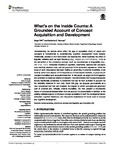What’s on the inside counts: A grounded account of concept acquisition and development
| dc.contributor.author | Thill, Serge | |
| dc.contributor.author | Twomey, K | |
| dc.date.accessioned | 2018-12-12T12:17:26Z | |
| dc.date.available | 2018-12-12T12:17:26Z | |
| dc.date.issued | 2016 | |
| dc.identifier.issn | 1664-1078 | |
| dc.identifier.issn | 1664-1078 | |
| dc.identifier.other | 402 | |
| dc.identifier.uri | http://hdl.handle.net/10026.1/13022 | |
| dc.description | addendum: [OA] owner: teslar timestamp: 2016.01.04 | |
| dc.description.abstract |
Understanding the factors which affect the age of acquisition (AoA) of words and concepts is fundamental to understanding cognitive development more broadly. Traditionally, studies of AoA have taken two approaches, either exploring the effect of linguistic variables such as input frequency (e.g., Naigles and Hoff-Ginsberg, 1998) or the semantics of the underlying concept, such as concreteness or imageability (e.g., Bird et al., 2001). Embodied theories of cognition, meanwhile, assume that concepts, even relatively abstract ones, can be grounded in the embodied experience. While the focus of such discussions has been mainly on grounding in external modalities, more recently some have argued for the importance of interoceptive features, or grounding in complex modalities such as social interaction. In this paper, we argue for the integration and extension of these two strands of research. We demonstrate that the psycholinguistic factors traditionally considered to determine AoA are far from sufficient to account for the variability observed in AoA data. Given this gap, we propose groundability as a new conceptual tool that can measure the degree to which concepts are grounded both in external and, critically, internal modalities. We then present a mechanistic theory of conceptual representation that can account for groundability in addition to the existing variables argued to influence concept acquisition in both the developmental and embodied cognition literatures, and discuss its implications for future work in concept and cognitive development. | |
| dc.format.extent | 402- | |
| dc.format.medium | Electronic-eCollection | |
| dc.language | eng | |
| dc.language.iso | en | |
| dc.publisher | Frontiers Media SA | |
| dc.subject | concept grounding | |
| dc.subject | embodiment | |
| dc.subject | developmental linguistics | |
| dc.subject | age of acquisition | |
| dc.subject | SPA | |
| dc.title | What’s on the inside counts: A grounded account of concept acquisition and development | |
| dc.type | journal-article | |
| dc.type | article | |
| plymouth.author-url | https://www.webofscience.com/api/gateway?GWVersion=2&SrcApp=PARTNER_APP&SrcAuth=LinksAMR&KeyUT=WOS:000372567800001&DestLinkType=FullRecord&DestApp=ALL_WOS&UsrCustomerID=11bb513d99f797142bcfeffcc58ea008 | |
| plymouth.issue | MAR | |
| plymouth.volume | 7 | |
| plymouth.publication-status | Published online | |
| plymouth.journal | Frontiers in Psychology: Cognition | |
| dc.identifier.doi | 10.3389/fpsyg.2016.00402 | |
| plymouth.organisational-group | /Plymouth | |
| plymouth.organisational-group | /Plymouth/Faculty of Science and Engineering | |
| plymouth.organisational-group | /Plymouth/REF 2021 Researchers by UoA | |
| plymouth.organisational-group | /Plymouth/REF 2021 Researchers by UoA/UoA11 Computer Science and Informatics | |
| dc.publisher.place | Switzerland | |
| dcterms.dateAccepted | 2016-01-01 | |
| dc.identifier.eissn | 1664-1078 | |
| dc.rights.embargoperiod | Not known | |
| rioxxterms.versionofrecord | 10.3389/fpsyg.2016.00402 | |
| rioxxterms.licenseref.uri | http://www.rioxx.net/licenses/all-rights-reserved | |
| rioxxterms.type | Journal Article/Review |


